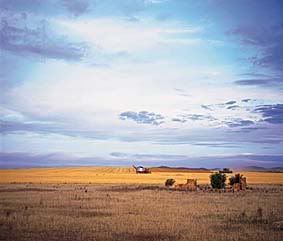It's The End Of The World As We Know It -- Thank God!
 Warmies are fond of saying their predicted global catastrophe will spell the end of the world as we know it.
Warmies are fond of saying their predicted global catastrophe will spell the end of the world as we know it.Well, since when has the world stayed as we know it? Look around. 2007 is vastly different, not just from 1907, but from 1997. Blink and the old world as we know it becomes a new world as we know it until it becomes another world as we know it.
That's why none of their gloomy predictions will come to pass, because of the shared ability of nature and humans to adapt. Here's a case in point from Australia, where the Warmies say a five-year drought can be blamed on global warming. Many farmers don't share that view, but they're not sitting around
You see, it's the end of the world as we know it. It's a new world where not only are the farmers getting by on less water, but they're storing carbon in the soil, and they're not burning the stubble, putting all those nasty hydrocarbons in the air.Alan Umbers of Grains Council of Australia, which represents 35,000 wheat growers, estimates that 60 percent of Australia's farmlands now use advanced no-till or minimum-till practices, which leave some stubble on the earth after the last harvest.
This replaces ploughing the soil, which causes moisture and nutrient loss, with accurate planting by advanced machinery, often guided by GPS systems, into the stubble-covered areas.
Australia would have produced only 3 million tons of wheat last year, instead of the 10 million tons it was able to eke from drought-parched lands, if it were using farm practices of the 1970s and early 1980s, Umbers estimates. ...
Zero tilling stores moisture where it is most needed -- in the ground. It also builds up carbon in the soil.
"We're taking carbon out of the air and storing it in the ground," Ed Fagan said, squinting from under a peaked cap.
Historically, soil around Cowra contained 1 percent carbon. Since zero tilling started three seasons ago, the carbon level has increased to 1.5 percent for a 50 percent gain. ...
[T]here are broad benefits. Land degradation is stopped. Water and carbon are stored in the earth. Crops are bigger. Seed wastage is minimal and even weed management is improved. (Reuters)
Less greenhouse gases, more food. It's a picture of human elegance, yet the Warmies wring their hands with worry and bead their brows with negativism and profess an utter lack of faith in the human spirit and our technological might.
That's why to me the Warming debate is over; it will be of no consequence to our lives, our children's lives or our grandchildren's lives. Their lives may be different, but so were ours, and our parents, and our grandparents from the generation before.
It's just the same old, same old end of the world as we know it.
Labels: Climate change, Global warming




<< Home